#but stop hating on the flashbacks when you clearly don't understand WHY they brought it up so much
Note
It's actually interesting you brought up Eren. He is one of the characters I was thinking about and I kind of somewhat thought while obviously what he is doing is without a doubt extremely bad because it goes into genocide, I kind of somewhat thought his situation is.... I guess massively complicated with the whole world having this view that is so deeply rooted that him and his people are Devil's on Earth and.... isn't so innocent and with that I thought people were as more understanding with his decisions even though it is like massively fucked up then Rose, and goes back to the whole thing with him having main character status.
I was kind of thinking Grisha was a bit more comparable to Rose because I kind of think he had a similar treatment with flashbacks and stuff as well as he's also guilty of something like the fact that he was abusive to Zeke and that got his first wife and other people who are against what Marley was doing to them captured and turned into Titans but I kind of feel like they showed his story in a way that makes him a lot more sympathetic and understanding and show his change bit more clearly then Rose when he was in the walls and you do got that one part like at the end of the series.
It did kind of made me ask myself if Rose is...kinda unique when compared to other characters? I'm not sure if it's accurate to say this based on the fact that it seems like other characters while done some questionable things seem more sympathetic or even forgiven in some cases more than rose. If we are just sticking with SU characters, I'm assuming the reason may have something to do with the fact that she does play a major part into why let's say CG's behave the way they do earlier in the series and that caused major problems among them and Steven and the fact that she's pretty much responsible for the entire series. I'm guessing that's how she's a lot more criticized. Other characters from the other franchises more interesting I have seen people seem to say Bojack, a character who is supposed to be like a very massive ass seem a little bit more empathetic? Although I think this is based on the opinions I have seen that the fact that he took responsibility and not Rose so I think responsibility might be a factor into this too
Now that you mention it yeah Grisha might be a better analogue for Rose, both being parents of the main character who set a lot of the events of the series in motion, and continue to influence the story long after they're dead. I think the reason people aren't so hard on him is that a lot of his more questionable moments are quickly overshadowed by things that Eren and Zeke do (especially when Eren was the one telling him to kill the royal family in the first place). The last time we see Grisha is when we realize that Eren had been manipulating him for some time, and the very next episode is when the Rumbling starts
Compare this to the last times we hear about Pink Diamond, which is when we learn about Spinel's backstory and about what happened to Pink Pearl. The choice to focus on these in the later episodes may lead the viewer to think that the show, and by extension Steven and the rest of the CGs, just hate her by the end. Steven very well might, which somewhat justifies the focus on her past mistakes, but I think it's clear that Garnet, Amethyst, and Pearl still don't. I just wish people would stop taking this as proof that "the crew hated Rose" or that "Rose is irredeemable"
And yeah you might be right about the whole "taking responsibility" angle, since a lot of these other characters usually don't get the "happy ending" of just living in freedom for a while, before dying in childbirth. What people forget is that Rose definitely did sacrifice a lot though, she gave up her entire way of life on Homeworld, and also lost almost all of her friends/allies except for Pearl and Garnet to the corruption bomb. The act of giving up her life to create Steven could be seen as selfishly running away from her problems and not taking responsibility, but there's another interpretation. Even after creating an entirely new persona and life, she still hates herself and would rather give up her life to create someone who can love themself instead. Is this "leaving her problems for someone else to deal with"? Yes, but that's not the whole story, and not considering how Rose probably actually felt about this goes to show that people barely see her as her own character, which is another reason she gets a lot less sympathy from fans
1 note
·
View note
Text
the fact that antis don't understand the importance of the meadow flashback for malina says everything i need to know about them.
#malina#yes yes it was repetitive BUT FOR A REASON#all they have was each other#no other home but each other#that meadow was their safe place where they could go and just be and feel safe#alina was taken away from her home (mal) and taken somewhere she did not want to go#she lost the only sense of home she had#that meadow represented safety and comfort and a sense of familiarity#if you're mad your ship doesn't have a special place with a lot of significance for them just say it#but stop hating on the flashbacks when you clearly don't understand WHY they brought it up so much#shadow and bone
28 notes
·
View notes
Text
The Final Stroke: Thoughts on Haru's conflict (+Rin)
Okay so reading all the summaries of The Final Stroke Part 1 has left me with A LOT of thoughts. About Haru, about Rin, about Rin & Haru and how all the different character conflicts will be tied together in Part 2.
BUT since I have been waiting YEARS for Free! to feed me some juicy Haru conflict, of course I'm sinking my teeth into that first because peeling off Haru's layers has always been my favorite Free! sport.
It's been a long while since I've tried to get into Haru's head AND I haven't even watched the movie yet so I'm probably wrong, but here goes nothing. As per usual, it will be long and image-heavy because I can't keep things short and sweet to save my life.
Also, it's heavy on spoilers about The Final Stroke so please do not read without reading Fencer's summary first!
AND since it's basically impossible to discuss Haru without discussing Rin and vice-versa, please do also expect a healthy dose of RinHaru.
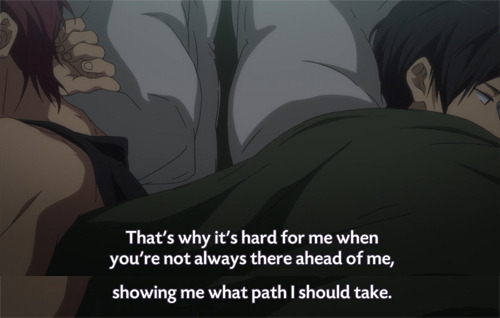
Utsumi: Indeed; it’s a path Haruka never would have chosen himself. But despite claims that he doesn’t care about winning or losing or scoring certain times, he’s always been attentive to Rin’s presence. [x]
Please assume there's a huge "IMO" attached to this whole post.
In Season 1, we saw Haru struggle to understand that the reason for his emotional turmoil was quite simply that he wanted to swim with Rin again.
In Season 2, we saw Haru struggle because he wanted to follow Rin into the Pro world, but he felt like he didn't deserve to do so because he didn't have a dream and thus, no strong feelings about competitive swimming itself.
Needless to say, there's a pattern.
In Season 3, the series kind of took a detour. Still, it did plant some seeds, the most important IMO being the following:
"After I hit 20, I will be..."
"If you ask me what lies ahead of me, I..."
"You can't survive without throwing something away. I didn't want to throw anything away. But I lost."
"Maybe I don't deserve to compete at the global level."
Road to the World adds some extra layers to all that by showing us just what else is connected to that fear of Haru's.
Because, what do we see after Rin tells Haru that no matter what wall [Rin] faces, the one thing that doesn't change is his desire to keep swimming with [Haru]?
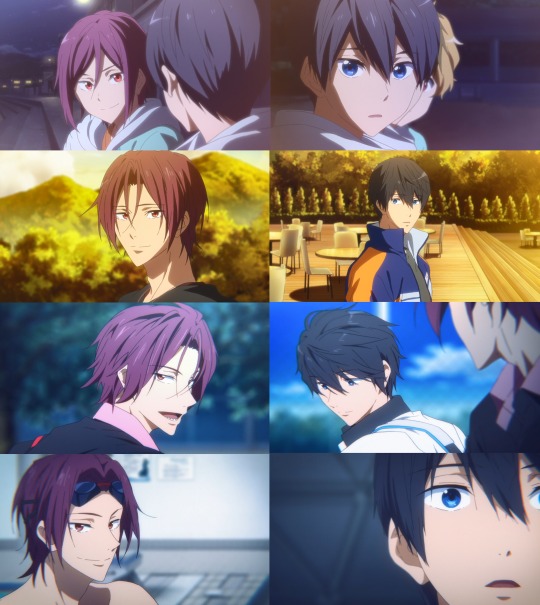
We see the moment Rin tells Haru "aim for the world with me, Haru!". Then, the moment Rin asks Haru what his dream is—right when Haru finally felt free after achieving the dream he had that season, that of swimming with Rin again. Lastly, we see the moment Rin asks Haru "what will you do?" when it comes to choosing between swimming in a recreational pool, or the one used by the National Team.
Every single one of these moments brought Haru closer to his dream—and Rin is the common factor in them all. So when Rin tells Haru,
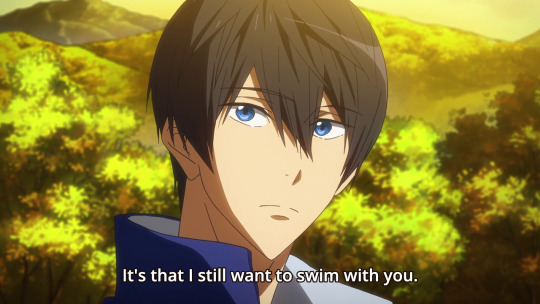
It's obvious by those flashbacks alone what Haru's answer is. He, too, wants to keep swimming with Rin in that world.
But before the thought can fully form in Haru's mind, Albert flashes through it. We immediately see Haru's disposition change, and the result is the most telling of all.
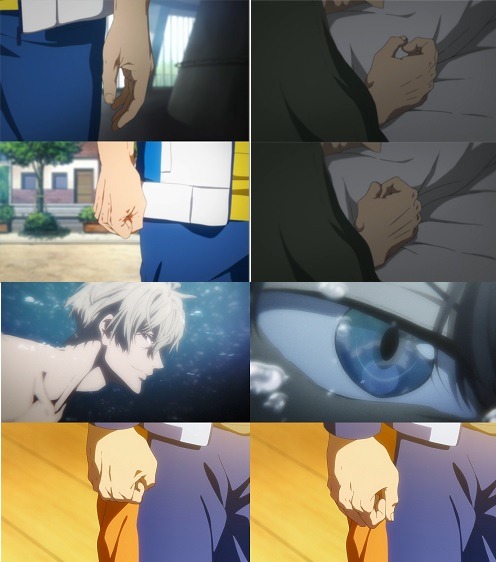
Just like always, the imagery is on point. Rin and his desire to swim with him give Haru strength and purpose and Haru clenches his fist—but this time, Albert seeps that strength from him until his fist goes limp. And suddenly, Haru doesn't know what to say to Rin anymore.
Because, what Albert makes Haru wonder, is this:

From my limited perspective (like I said before, I haven't watched TFS yet), I think that might just be where the heart of Haru's issue in The Final Stroke lies.
I think a big part of why Haru wants to win against Albert so badly is probably because he wants to prove to himself that he does deserve to be in that world—like Rin. That all his friends are right to believe in him.
And he feels even more pressured because he thinks he's running out of time.

All this pressure to win—not to feel the water better or to be the best in the water he loves so much, but simply to win before he's "ordinary"—does not let Haru swim freely. He doesn’t swim like himself.

He is probably terrified of his own limits and of how close he might be to hitting them, and this fear and pressure are binding him.
Moreover, while Haru decided that he wanted to swim in that world, the truth is that he doesn’t know what the future holds for him.
He has no long-term, tangible plans. Unlike Rin, who wants to win a gold medal, Haru just wants to swim "in the whole world". This, added to the fact that he thinks he’ll be ordinary by 20 and that he has not managed to beat Albert, makes it so Haru is basically blinded to what the future can bring for him. He can’t see that sight.
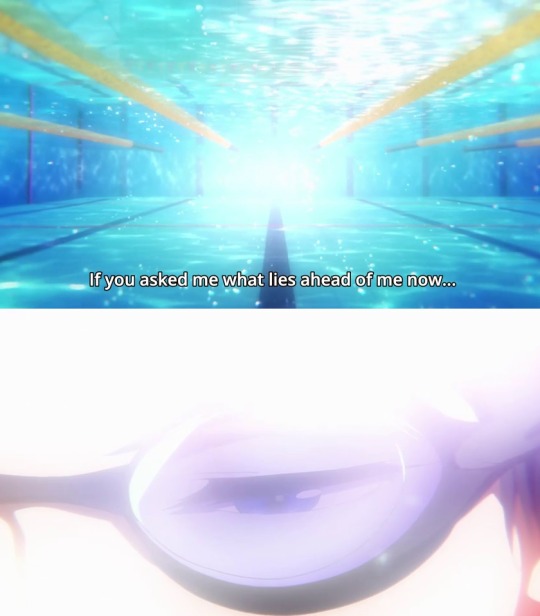
Part of the reason for this, I feel, is that the series has never addressed the big elephant in the room.
What exactly does Haru get out of competitive swimming, besides swimming with Rin? Because "swimming in that world" is nice and sweet and idealistic, but it doesn't cover the fact of racing itself.
I used to talk a lot about why Haru needed to find a reason to enjoy competing even when it isn't against Rin. That he needed to find a reason to want that for himself. I even thought S3 may finally go for it, but it ended without Haru finding meaning in that "world of wins and losses", as he used to call it.
Usually, he’d look at Rin to point the way forward. And it is knowing that Rin (and to a lesser extent, Ikuya) is there fighting with him and aiming for the world as well that gives Haru some reassurance.
However, from what we know from the summaries, Haru isn’t thinking of them when he swims. He is entirely caught up on needing to beat Albert because of what it has come to represent to him.
There’s also the issue of Haru’s competitiveness. Haru spent a long time suppressing it and only indulging in it with Rin. But he has always wanted to be the best in the water—the one who "feels" it best.
It wasn’t that he wanted to win, or that he hated losing; it was just that he couldn’t simply accept that there was someone who could feel the water more than he could. (x)
So when you combine all of this, I feel like Haru has lost sight of the most important thing—that instead of swimming just to win, like it’s a job, he should swim to feel the water he loves so much and, most importantly, for the team (with his friend’s feelings in his heart).
That way, he could swim like himself and the water won’t be sad nor lonely.
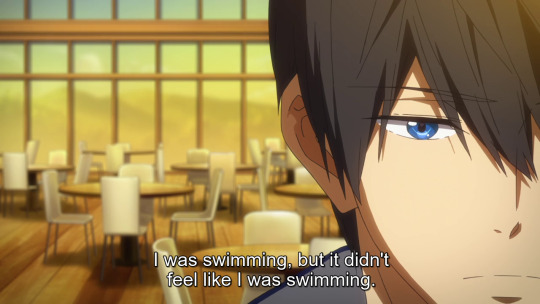
This all sounds like a lot and it is. Haru is all but suffocating under this weight.
So, when Rin comes and tells him that [Haru] will be facing Albert alone—that they aren’t fighting him together, like Haru hoped for—Haru snaps.
It’s not only that what Haru perceives as the biggest obstacle to his dream (Albert) is standing before Haru (alone) and Rin won’t be there to share his struggles, but also that Rin is the reason he’s there in the first place because Rin is the one that made Haru stop wanting to be ordinary.
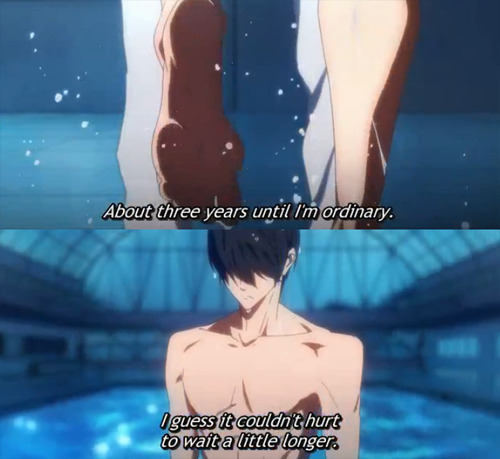
He’s the reason why he’s gotten to this point and the reason he came into the global stage and ran into Albert. He’s also the biggest thing Haru will lose if he can’t win against Albert—because if Haru’s dream ends, he won’t get to swim with Rin in that world anymore.
And now Rin’s walking away from swimming free and leaving him alone with this beast of a swimming machine and with [Haru’s] own limitations. And Haru feels trapped. He feels bitter. He feels betrayed. Terrified.
And, of course, lost. Because just like Rin once said, "Without you, I have nothing to aim for, you know?"
So, he snaps.
And by burning bridges with Rin, the very embodiment of "For the Team", the one person that he has always wanted to swim with most of all, the one whose feelings he was still connected to above all—by virtue of swimming together in that world, by sharing a dream—Haru now feels like he's truly alone in the water.
Haru is essentially turning his back on the very reason he swims for—in more ways than one. So, he’s becoming a second Albert. Only there to win, not to have fun.
Because that’s the thing. Haru says he’s doing it for his dream, but since he can’t see that dream clearly, he lacks direction. All he can see is the immediate future and all that stares back at him are his own limitations—embodied by Albert himself.
Albert represents, then, the road Haru must not take. Haru can’t be all about becoming stronger simply for the sake of winning—and he must definitely not do so alone. Like Ikuya said in S3, if Haru isn't gaining that strength for someone else (the team), there's no point.
So, since this is Free!, Haru needs to go back to his roots and truly swim for the team once again. But I feel like he also needs to re-contextualize his dream and truly define what it entails, for once and for all. Which, if we go by everything we've seen so far—should involve swimming with Rin.
Only then will he be able to swim freely again.
There's A LOT of foreshadowing and things from S3 that will most likely play a role in that and I haven't even touched Rin's choice to not swim free anymore, but this has gotten really long and I've run out of image slots lmao so I'll just have to ramble about those some other time 🙇♀️
#rinharu#harurin#nanase haruka#sharkbait#me: swimming idiots#the final stroke spoilers#skip this if you don't want any spoilers!#I am so sorry for this huge wall of ramblings but Haru is back to being fascinating and I'm loving every second of it#this post has a huge brain storming feel to it because it's basically while I wrote while trying to make sense of my thoughts on haru's#I may be 100% off though since visual cues are essential in getting haru and I haven't watched the movie#but making a fool of myself is part of the fun so speculating here I come lmao
107 notes
·
View notes
Text
Long ass post about the Eternal family not being a copy-paste from ATLA (aka I like the memes but my god can you please stop)
Because some people truly think that Vaylin is off-brand Azula, Arcann is Zuko and so on.
It's. Called. A. Trope. (I mean how often do we come across abusive manipulative fathers in media? Mothers who couldn't much to change anything? Children, desperately looking for their parent's approval no matter what?)
Of course, you have to consider the fact that the writing of ATLA is simply better than of KotFE/ET, so this might have been one of the reasons why people say that.
Spoilers for Avatar: The Last Airbender, Knights of the Fallen Empire and Knights of the Eternal Throne expansions!
Okay, so here's my unprofessional, maybe biased, not super deep take.
(not going to mention that all of them are members of royal, ruling family, kinda obvious)
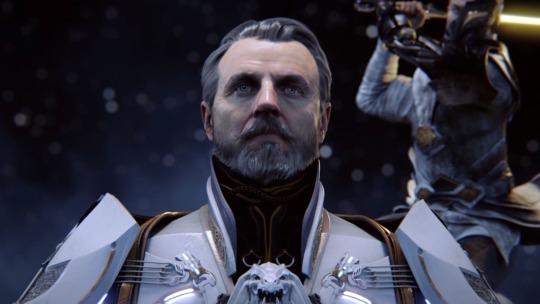
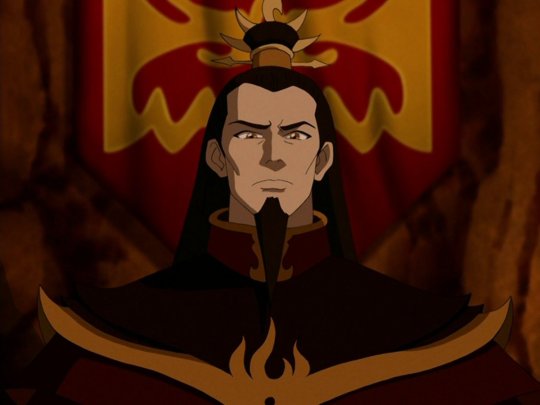
What roles do they play in their stories? Well, both Valkorion and Ozai are main antagonists, but their presence throughout the story is very different. Ozai is rarely shown in first two seasons, we don't even see his face until season 3. He doesn't have a direct connection to the protagonist, they only meet at the very end of the show, and Ozai's role is to pose a threat to the world, while Aang's is to save it. Valkorion, on the other hand, is constantly on the screen, interacting with the main character, challenging their viewpoint and influencing them directly. His end goal is similar to Ozai's (destroy everything and be the only ruler of the his nation), but with one major difference - he's trapped in Outlander's mind, so to achieve his goal Valkorion attempts to take control of the main character. Their interactions play important role in the story, and we spend a lot of time with Valkorion.
In addition to that, their relationship with children are also not exactly the same. It seems like Azula is Ozai's favorite and Zuko is a failure in his eyes until he meets his expectations, and the same goes with Vaylin, Arcann and Valkorion, right? Well, partially. Indeed, Valkorion and Ozai's treat their sons in similar ways (are disappointed in them until they meet their expectation by doing something that goes against their morals), but when it comes to Vaylin and Azula, it's not that easy. See, Valkorion claims that Vaylin was always his favorite creation (even though we know it's actually his empire), and he certainly seems to take pride in her potential in the Force. But her power is the very reason he's afraid of his own daughter, and in this fear Valkorion literally locks Vaylin away and allows to put her through physical and mental torture just to make sure she won't become a threat, won't overpower him. Maybe he thought of her better than of Arcann, but she wasn't his favored child for sure. I don't want to say that Azula hasn't experienced abuse from Ozai, but for the most part he clearly favored her over Zuko. He has never shown fear of Azula's power and abilities (or at least I haven't noticed), quite the opposite - allowed her to do a lot, as long as she brings results.
I could also mention their slightly different characterization (mostly that we get more characterization of Valkorion, get to learn his motivations, views, philosophy and all that, also he's portrayed as more nuanced, even if he not really is) and role in their respective governments (ozai is one of many Fire Lords and arguably not the greatest, while Valkorion is a god to citizens of Zakuul, their only Immortal Emperor), but those are details, and I think you get the point.
What's similar: role of the main antagonist, manipulative and abusive father, goal of destruction of everything that isn't their nation/empire, relationship with disgraced son.
What's different: presence in the overall narrative, relationship with the main character, relationship with daughter, role in their societies.
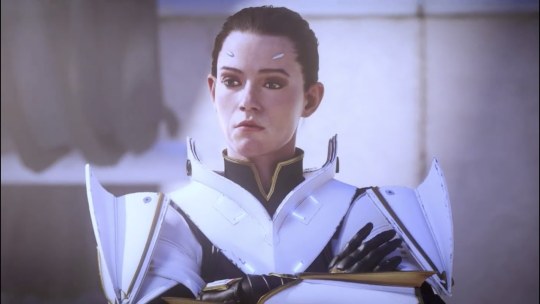
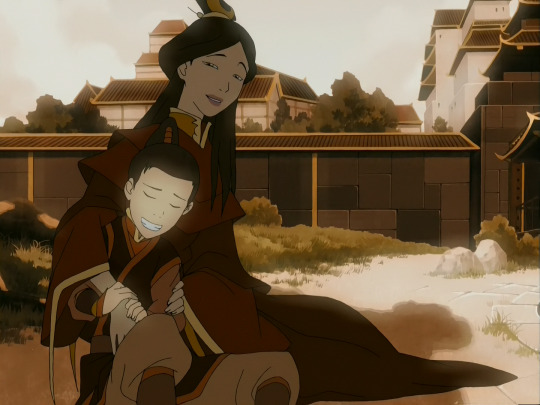
Senya and Ursa are even less similar. Yes, they both are mothers who love their children, but have to leave them, but these are probably the only things they have in common. Just as with Ozai and Valkorion's presence throughout the story, Ursa is only shown in flashbacks (for obvious reasons), and Senya is one of major characters in KotFE and (a bit less major) in KotET. Ursa leaves because she has to kill Azulon in order to save Zuko, and later isn't present in the story (I'm aware that her fate is told in comics, but we aren't talking about it). Senya leaves because when she tries to take children with her, they refuse, and she understands that she can't force them to, nor she can help them to break free from Valkorion's manipulations. For a long time she's absent from Arcann ad Vaylin's lives, but at the time of game events she attempts to save her children and stop the madness and destruction they've caused, and it isn't a small part of the story.
I also want to add that their relationship with Ozai and Valkorion are also different, but can't say much about Ursa. I heard that she didn't choose this marriage and suffered emotional (and maybe physical???) abuse from Ozai. I can say with confidence, though, that Senya genuinely loved Valkorion, and strangely enough, he seems to at very least respect her. But, of course, this wasn't the best marriage either.
Plus, we see more of Senya's relationship with Vaylin than Arcann or Thexan, but with Ursa we see her more with Zuko than Azula. Just a detail to remember.
(also Senya is simply a better character but that besides the point, moving on. in this house we stand Senya)
What's similar: role of loving and caring mother, abandoning their family at some point.
What's different: presence in the overall narrative, relationship with husband, characterization in general.
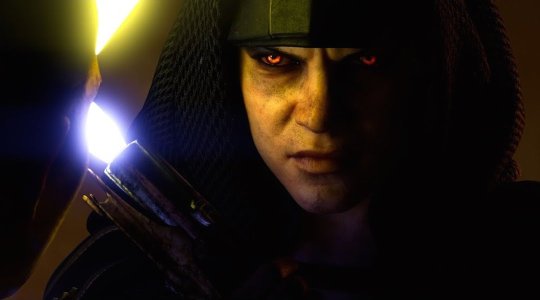
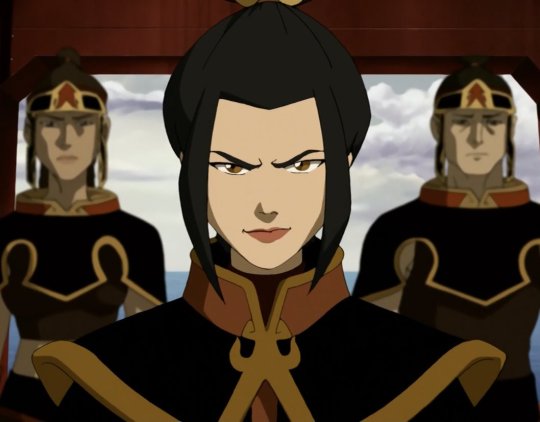
Boy, where do I even begin. Vaylin and Azula are similar in that they are both extremely powerful (one is firebending prodigy, the other is potentially stronger than Valkorion), both are cruel "craaaaazy" (i hate that cliché), both are younger sisters, have serious mother issues (seemingly more so than father issues), both go through betrayal of people they could always rely on, which eventually leads to their downfall. But when I took a look at their personal arcs, it became clear that they aren't the same (unfortunately, Vaylin's arc is very rushed and underdeveloped, but we'll have to go with what we have and my personal view, sorry).
There's a really good video about writing corruption and madness, and I'm going to base my thoughts on it. To summarise it: a good corruption arc should have 4 components:
- the character has a specific goal (or a goal and subgoals);
- in pursuit of said goal they become the cause of a significant event that brings serious consequences;
- as the result of these consequences, character abandons their morals, ideals or a code in pursuit of goal;
- character either will not achieve their goal or will succeed, but it won't be enough to satisfy them.
And then the author brings Azula's arc as one of the best examples of compelling story of corruption (so basically, she represents it perfectly). In short, Azula's main goals are perfection and control, and subgoals help achieve the main ones. In pursuit of these goals, Azula causes Mai and Ty Lee to betray her (by pushing them too far to do something they wouldn't do), which then causes her to become paranoid, which makes her to attempt controlling everything and everyone around her, *breathes* which makes her lose control over herself and ....
Now, I thought if Vaylin's arc could fit into a corruption one, and next part will be based a lot on my assumptions and personal view of her character (plus rushed writing doesn't help), but I think yes (or at least mostly). The difference is in goals, ideals and details.
While the story strongly makes us think that Vaylin's goal is freedom (or control over her life and everything around her) or power and destruction, I think it's actually self-determination (which was said by Tenebrae in 6.2) and feeling safe. Let me explain (and here I thought this would be a short comparison). Sure, when Valkorion caged Vaylin on Nathema, he took choices and control over her life from his daughter. But let's not forget whom Vaylin blames for this (even more than Valkorion): her own mother, and I think this details tell us that the most important thing that Vaylin lost on Nathema is feeling safe. Then, after Arcann brought her home, I assume Vaylin still didn't feel safe enough under Valkorion's rule, still too afraid that he'd simply send her back to that hellish place.
It's when Valkorion is struck down Vaylin finally has a feeling of personal safety, even if she isn't the one on the throne. Why? Because back on Nathema there were two people who haven't turned on her - Arcann and Thexan (yes, this is also a huge assumption, bc the game states that only Thexan visited her, but it doesn't make much sense).
I've always noticed (and I'm not alone in this) that her behavior in Fallen Empire is different from the way she acted in Eternal Throne. Most likely bc of rushed writing, but I see a character driven reason here. In first of these expansions, Vaylin is the second person in power on Zakuul, and with Arcann being in charge, person she can trust more than any other living being, she feels safe - she can test her power, and now Valkorion won't prevent it, she can do pretty much everything she wishes, and the most Arcann will do about this is mildly complain (without blaming her). Really would be nice if we got to see any normal hobbies of Vaylin (like wasn't there something about books or art?), but I digress. She might have some questions about Arcann's tactics, but they get along just fine. The important thing to note is Vaylin not seeking to hunt the Outlander personally, to rule or conquer the rest of the galaxy, or trying to achieve absolute freedom or power. She's kinda there.
This, however, changes when Arcann doesn't allow Vaylin to kill Senya. Their relationship was getting somewhat worse towards the end of KotFE, but this is a turning event Vaylin caused by attempting to strike her mother. By saving the person Vaylin blames for all the trauma from sending her to Nathema, Arcann threatened her feeling of safety. And now Vaylin starts to believing that to achieve safety she now needs to kill people who hurt her (that's why she's so determined to find Senya and Arcann), take the throne and hunt down Outlander (she was manipulated by SCORPIO to these subgoals).
(The following is the weakest, I'll admit, but I hope I can at least express what I see). So, in trying to achieve goals she didn't want before Vaylin loses in self-determination, being either driven by overwhelming anger or manipulated by others (SCORPIO or Commander on Odessen), desperately trying to accomplish anything, or even goes against her morals (like by erasing GEMINI's free will protocols, when earlier she agreed that freedom to choose is important; or breaking the deal on Odessen). All of these result in her downfall.
But even this isn't the end. The key difference between arcs of Azula Vaylin lies in it's resolution, or that Vaylin have a chance to overcome corruption in the main narrative (and Azula doesn't. again, not including comics here, sorry). After death, Vaylin is again controlled by Valkorion in Outlander's mind. First time physically (she can't resist it), second time mentally. This is where Vaylin has to choose - kill brother who betrayed her and Commander who killed her, or go against Valkorion, person responsible for almost all of her pain and trauma. She has t choose by herself, and I think it's a good start.
Now, before 6.2 we all thought Vaylin was dead for good, but that story update hinted at possibility of her coming back to life. What I like to think is that now that she dealt with people responsible for her trauma (helped defeat Valkorion and actually for once listened to Senya), Vaylin can now have a different life, finding herself with support of someone she doesn't hold a grudge against and who treats her well (Satele, I mean).
I'm so sorry for going into details, but I needed this long explanation to present the point (and I suck at explanations). As said before, this is my version of her arc, and most likely wrong interpretation, but even with personal freedom of choice, Vaylin character differs from Azula a lot.
Need I mention that Vaylin relationship with Arcann and Valkorion are drastically different from those between Azula, Zuko and Ozai?
(Also a little detail - with royal family of Fire Nation, Azula is the golden child, while with Tiralls it's actually Thexan, not Vaylin).
What's similar: role of extremely powerful, emotionally damaged daughter with little to no regard towards others, close people betraying them, resulting in their downfall.
What's different: characterization, role in the narrative, relationship with father and brother.
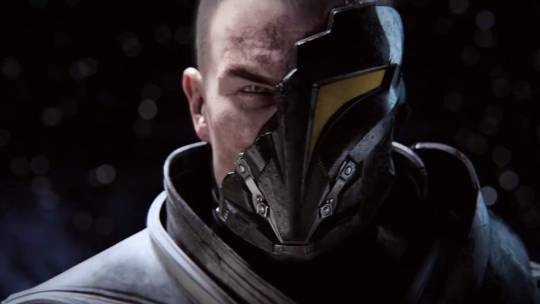
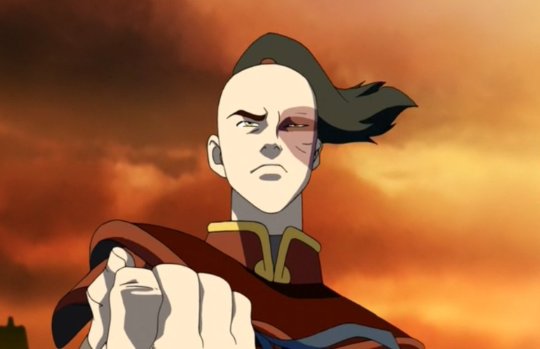
Arcann and Zuko is the most difficult part, but I still believe that calling Arcann just a cheap copy of Zuko is incorrect.
So, they fall into role of less successful son, always getting disapproval from father, being in shadow of more talented sibling, both obsessed with capturing the main character but ending up helping them end the war after going through a redemption arc with help of caring family member. Even both have scars on left side of face. Yeah, seems similar. I still think they are different characters.
Let's start with their relationships with family. In Valkorion section I said that his attitude towards Arcann is similar to that of Ozai towards Zuko, so not going to spend too much time here. However, there's slight difference - Zuko didn't kill his father even he had a perfect opportunity (bc it wasn't his goal), Arcann did (bc it was one of his goals), which says something about their characterizations.
Zuko and Ursa were shown to have a good mother-son relationship, and it played a role in Zuko's character. With Arcann and Senya, we don't really know (not much was shown in expansions). We know Arcann didn't hate his mother, but possibly didn't have warm memories of her either. The reason is most likely, like Senya said, her children wanted nothing to do with her (which is a bit untrue about Vaylin, but okay) and leaned more towards Valkorion. We need to remember that on Zakuul Valkorion isn't just one of many great leaders, he's the greatest, and seen as a god by most citizens, so safe to assume the same would apply to his children as well.
Zuko and Azula's siblingship (i'm out of words) is a bit similar to Arcann and Vaylin's in way of brother knowing that his sister isn't good, but still caring about them (even if not showing). At least it's what I saw. What's different is how Azula treats Zuko, compared to how Vaylin treats Arcann. I think Azula showed compassion or concern for Zuko maybe twice, but I'm not entirely convinced that it was 100% sincere. Vaylin, on the other hand, seems to trust and care about Arcann (with bits of sass and questioning his life choices), and switching to complete opposite after him saving Senya. Also, I don't she ever called Arcann a failure in their father's eyes.
Now I want to say that their roles in stories aren't the same either. Sure, both are introduced to us as antagonists, but in reality, Zuko was never a true antagonist (we get to learn this somewhere mid-season 1), when Arcann remains the main antagonist for whole of KotFE. Zuko didn't start a war and didn't participate in conquest of other nations too much, his main goal was to capture the Avatar so to restore his honor (and deserve his father's forgiveness). Honestly, I think it's safe to say the Zuko is one of two main protagonists of ATLA. Why does Arcann want to capture the Outlander? Solely because his father's spirit still lives inside this person's mind, and the best solution to keep Valkorion away from the galaxy is not letting the Outlander free (hence the carbonite freezing). And Arcann doesn't want or need Valkorion's forgiveness when he attempts to kill him (or kills him, depending on your choice. anyway, his action directly leads to Valkorion's "death"). And right after that he becomes a ruler of Zakuul and begins the conquest of Republic, Sith Empire and everything he can reach (the reasoning behind this is still unclear to me though; maybe because he was raised with ruling Zakuul in mind and he didn't anything else, idk). Point is, he's responsible for war and main's character imprisonment, which makes him the main antagonist of KotFE. They have it the opposite ways - Zuko starts as disgraced prince, supported by a little group of people, and in the end he's recognized and appreciated by his nation, and Arcann starts as respected by his empire, later becoming less and less loved, until some groups start rebelling his rule, and in the end he doesn't get to rule Zakuul again.
This leads me to their morals. See, Zuko didn't have the worst morals in Fire Nation, even more, he expressed care for loyals soldiers of his nation before getting punished by Ozai. During first season (and about a half of second one) his views on other nations are what he was taught before. However, these views are challenged by travelling in Earth Kingdom, witnessing people suffering from war Fire Nation started and hating its people (you already know all of this), and with this he comes through final stage of redemption when he's back home. Unfortunately, Arcann doesn't go through this, and he's shown to be more ruthless.
Alright, when it comes to their redemption arcs, well let's say they are different (both in quality and the way they go through it), I'm just a bit tired of long explanations at this point. Zuko's arc is one of the best ever put on television, and Arcann's... well, it definitely has potential, but is criminally underdeveloped (there are other people who will explain it better than I ever could).
What's similar: role of disgraced son, living in shadow of their sibling, serious injuries on the left side of face (though with different meanings), obsession with capturing the main character, having a redemption arc.
What's different: role in the narrative, role in their society, characterization, relationship with sister and mother, different end goals (before redemption), paths to redemption.
#ah. ofc it didn't show in the tag bc of the youtube link. ofc. gonna be down bc of this)#hey look at me rambling about something only maybe 2 people take seriously#also i noticed that parental characters are better in swtor and children characters are better in atla. do what you want with this#it's 3:30 am i should be sleeping but here instead writing this#(forgive if i have some spelling mistakes. brain shutting down but i won't be at peace if i don't post it right now)#okay so if you have thoughts on this... you really don't have to waste time on this#i really only wrote this because i was annoyed by some peeps on reddit claiming vaylin is off-brand with a straight face#(and then posted this on tumblr bc i don't want to suffer those people on reddit)#what am i doing with my time#(not gonna tag atla bc it's not really about it)#swtor#arcann#vaylin#valkorion#senya tirall#kotfe#kotet#pauletta's babbling#pls send help#(or oc aks to give me some free serotonin but no obligations ofc)
50 notes
·
View notes